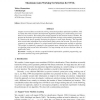Free Online Productivity Tools
i2Speak
i2Symbol
i2OCR
iTex2Img
iWeb2Print
iWeb2Shot
i2Type
iPdf2Split
iPdf2Merge
i2Bopomofo
i2Arabic
i2Style
i2Image
i2PDF
iLatex2Rtf
Sci2ools
118
click to vote
JMLR
2006
2006
Maximum-Gain Working Set Selection for SVMs
Support vector machines are trained by solving constrained quadratic optimization problems. This is usually done with an iterative decomposition algorithm operating on a small working set of variables in every iteration. The training time strongly depends on the selection of these variables. We propose the maximum-gain working set selection algorithm for large scale quadratic programming. It is based on the idea to greedily maximize the progress in each single iteration. The algorithm takes second order information from cached kernel matrix entries into account. We prove the convergence to an optimal solution of a variant termed hybrid maximum-gain working set selection. This method is empirically compared to the prominent most violating pair selection and the latest algorithm using second order information. For large training sets our new selection scheme is significantly faster.
Algorithm | JMLR 2006 | Selection | Working Set |
Related Content
| Added | 13 Dec 2010 |
| Updated | 13 Dec 2010 |
| Type | Journal |
| Year | 2006 |
| Where | JMLR |
| Authors | Tobias Glasmachers, Christian Igel |
Comments (0)

